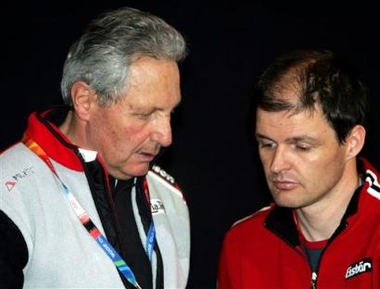|
IOC forms panel to probe Austrian case
(AP)
Updated: 2006-02-26 11:04 TURIN, Italy - The IOC formed
a special panel Saturday to investigate the doping scandal surrounding Austria's
cross-country and biathlon teams at the Turin Olympics.
International Olympic Committee president Jacques Rogge appointed a three-man
disciplinary commission to look into all the elements of banned coach Walter
Mayer's involvement with the team.
 |
| Markus Gandler, head of Austria's biathlon and cross-country team,
right, confers with Jo Schmid, spokesman of Austria's Skiing Federation
during a press conference in Sestriere, northern Italy, Friday, Feb. 24,
2006. Gandler made a statement concerning last week's anti-doping raid on
the Austrian biathlon and cross-country teams, the first raid on Olympic
athletes involving police. [AP] |
Mayer's presence in Italy triggered a police raid on the Austrians' private
lodgings and no-notice doping tests by the IOC on six cross-country skiers and
four biathletes. The tests came back negative Friday, but the IOC and Italian
police are pressing ahead with the case.
The disciplinary panel is made up of German IOC vice president and lawyer
Thomas Bach, Ukranian member and former pole vaulter Sergei Bubka and Swiss IOC
executive Denis Oswald.
The IOC had indicated the panel would be formed sometime after the close of
the games on Sunday, but Rogge decided to set up the group after briefing the
IOC executive board Saturday morning.
IOC spokeswoman Giselle Davies said the commission will begin working "from
next week onwards," in a process that could go on for weeks or months.
The panel will investigate "the whole Mayer affair, the big picture," she
said.
Davies said the IOC had not yet received any official information from the
Italian authorities on the raid, which will be a key element in the Olympic
body's inquiry.
The IOC can punish athletes, coaches and teams without positive tests,
relying instead on police evidence or proof of possession of doping substances.
The IOC said Friday that the 10 negative drug tests were "only one element in
what is undoubtedly an affair which goes far wider."
In addition, the IOC is doing follow-up blood tests on the athletes to look
for evidence of possible blood transfusions. The 10 negative tests involved only
urine samples.
Under the IOC investigation, athletes could be disqualified retroactively and
have their Olympic results annulled. Austrian team officials and coaches also
could be sanctioned.
The IOC and police targeted the Austrians last Saturday at their rented
accommodations in the mountain villages of Pragelato and San Sicario. Police
seized what they described as blood equipment, syringes and other materials.
Mayer, who was implicated in a blood doping case at the 2002 Salt Lake City
Games, was banned by the IOC from the Turin Olympics and 2010 Vancouver Games.
He fled Italy in the wake of the raids, only to crash his car into a police
blockade just over the Austrian border and ending up in a psychiatric hospital.
Italy's top anti-doping prosecutor, Raffaele Guariniello, said Saturday that
materials seized in the raid were still being analyzed. Once the results came
through, authorities would offer "full collaboration" with the IOC, he said.
In Sestriere, a top Austrian Olympic official also promised full cooperation
with the IOC investigations.
"Austria has great relations with the IOC," said Heinz Jungwirth, general
secretary of the Austrian Olympic Committee. said. "We don't want to put
anything under the table."
Jungwirth defended Mayer's right to be at the games.
"He's a free person," Jungwirth said. "We have no moral obligation to keep
him away from here. As far as we're concerned, he's a tourist."
|